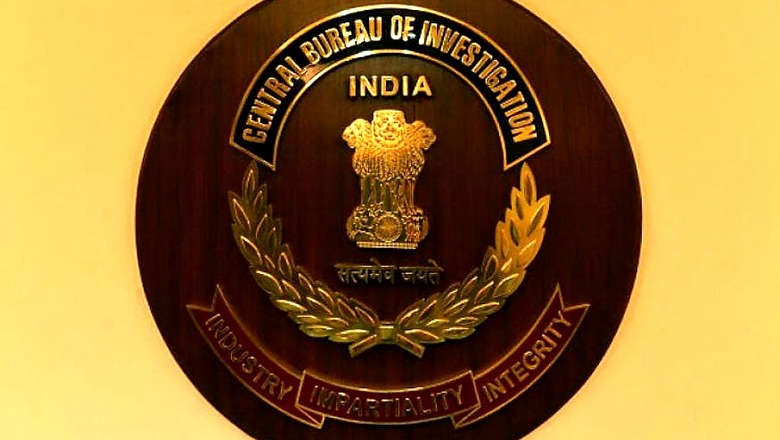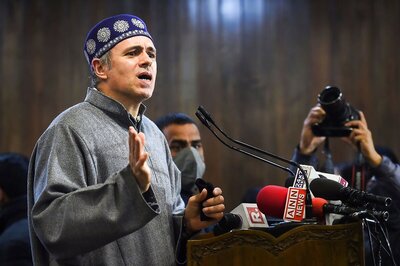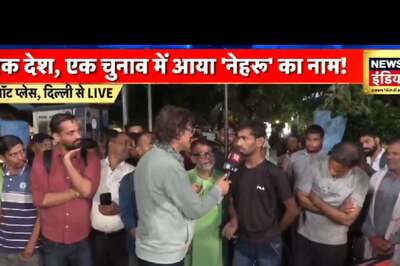
views
New Delhi: It was a perfect December evening; cold, windy and in spite of Delhi, a clear sky.
Three young IPS officers, didn't want to waste the moment and soon a bonfire and the rum began.
As is common these parties, the cadre and departmental gossips started flowing. That's when an officer quipped: “Post Gujarat, ED has taken a clear lead, CBI needs to do something now.” The rest had a rather sardonic smile on their face.
For the uninitiated, the reference was to the two arrests made by the Enforcement Directorate (ED) in an alleged Bikaner land scam with alleged links to Robert Vadra. The CBI, meanwhile, lost the massive 2G case in court with the judge ordering the acquittal of all accused, including DMK leaders A Raja and Kanimozhi, bureaucrats and top telecom executives.
India's premier investigating agency, the Central Bureau of Investigation, has often been called 'His Master's Voice' irrespective of the government in power.
From the 'Congress Bureau of Investigation', as it was called in the hay days of UPA regime to the 'Gujarat Bureau of Investigation' (over the increased presence of Gujarat cadre officers), the names change but the allegation remains the same.
Opposition alleges that over the last three years, there has been a competition among various agencies as to who can arrest the maximum number of opposition leaders.
Of all the cases being investigated by the CBI in recent past, only one had a press conference by a top CBI officer. No prizes for guessing, it was also the most politically relevant case of the period — an FIR against Lalu Prasad and his son in a corruption case.
The case gave Nitish Kumar requisite fodder to dump his erstwhile partners the RJD and Congress, and embrace BJP yet again.
WHAT AILS CBI?
But if you thought that's what is ailing the agency the most, then you are mistaken. While political interference has been the bane of the CBI in successive government, what is crippling the agency further is the lack of staff strength.
As the year draws to an end, and New Year resolutions become fashionable again, the government needs to make one for the agency: to fill up its rank and file.
According to a parliamentary panel report, the agency is short-staffed by at least 20%. Around 1,594 positions out of 7,274 are vacant currently in CBI. This includes about 20% vacancy among executive rank officers and this is what pinches the most since these are the officers who investigate the cases in CBI.
Sources say that among the senior officers there is a vacancy of one Special Director, two Additional Directors, eight Joint Directors, 18 Deputy Inspector General and 54 Superintendent of Police at this time in the CBI. With the sanctioned strength of 7,274, the CBI has the capacity to handle 700 criminal cases a year. A 20 percent vacancy decreases this capacity further.
In a written reply to the Lok Sabha this August, Minister of State for Personnel Jitendra Singh said: “A total of 1,369 cases are under investigation, 175 of them for more than two years, with the CBI. Of the total, highest 800 are pending for less than a year and 394 for between one to two years.”
This means while the CBI can effectively handle only 700 cases a year, just the backlog is more than double the number.
Former Special Director ML Sharma says that though the CBI is the biggest investigating agency, the strength of CBI does not commensurate the workload.
According to him, it is the vacancies in the executive rank which is most vital. The executives are the officers from the rank of Inspectors, Additional SP and Deputy SP. These are the officers who actually investigate the case, SP onwards are supervisory officers. And this is a problem which has been ailing for quite some time.
THE STAFF STRUCTURE
Former CBI director AP Singh points out that this shortage is because of the way the staffing was decided at the time of inception. Around 40% of the staff were supposed to be the direct CBI recruits, while 60% of the staff were to come in on deputation.
The whole idea was that the CBI would benefit from the state police officers in cases of special crimes like murder, rape and others. The state police officers have more experience in these cases. The plan was to get them on five-year deputation to the CBI. But the problem arises because most state police officers are reluctant to join the CBI as they don't get the same power that they otherwise enjoy.
AP Singh says, “While a Deputy SP or even an SHO is a big post in state police, in CBI they are just foot soldiers. There is very little independence of working, you are closely supervised.” Not just that, the perks that an inspector gets in his police station no way match up to what he gets in the CBI.
The CBI has a system of hiring direct sub-inspectors who can, by the time they retire, reach the position of Joint Director. They form the original CBI cadre. The senior officers are all IPS officers, who are brought in on deputation. For example, the current CBI chief Alok Verma had never been posted in the bureau before he came in as the director.
BANE OF BEING THE FAVOURITE
Across the country, wherever a doubt is raised about a local police probe, first instinctive reaction is to seek a CBI probe. This has led to extraordinary number of cases being handed over to the CBI.
A senior officer currently working in the CBI says while these vacancies were all there, this problem has become more acute of late, as the number of cases allotted to the CBI has gone up in recent times.
The fact that sensational murder cases like the Ryan International School murder probe have turned into a complete new direction, also raise hope among others to refer their case to the CBI.
Cases like Vyapam scam take up huge amount of resources. One of the chargesheets filed by the CBI has over 900 accused. Commenting on the situation, a senior officer of the agency said the hearing might as well be done in a stadium, the only place which can fit over 900 accused, their lawyers, security and the investigating officers.
The government too lists large number of cases referred to the CBI by courts and state governments as the reason behind the delay in timely completion of investigation.
ML Sharma says if only the courts would be a little kind on the CBI and not burden them with innumerable cases, the agency can work better. He mentions that the quality of probe erodes at times because of this overload.
When the same agency has to prioritise politically sensitive cases, the other cases suffer even more and the effect is often visible in numbers.
QUANTITY HITS QUALITY?
Minister of State for Personnel, Public Grievances and Pensions Jitendra Singh informed Parliament in April that there has been a dip in the conviction rate.
The minister said that in 2014 the conviction rate was 69.02%, in 2015 it was 65.1% and in 2016 it was 66.8%.
AP Singh points out that as it happens in every other place, whenever a new important case comes in, officers who are already part of other investigations are called in.
For example, when Vyapam came up, SP Vivek who was part of the 2G probe was made a part of the Vyapam team. While CBI maintains his role was over in the 2G case, questions remain on whether his assistance could have helped during the trial stage. The question becomes even more pertinent since the CBI has lost the case and the judge has almost blamed prosecution for it.
WHAT IS THE SOLUTION?
AP Singh is candid when he says that till he retired as the director there was no clear cut solution to this complex problem. While there has been some demand internally to increase the strength of CBI cadre officers within the organisation, he says this will hamper the CBI's multi-directional expertise; a view which has also been shared by ML Sharma.
The other option as per AP Singh is to increase the number of officers from the paramilitary forces. The officers from these forces like ITBP, CRPF, BSF, CISF and others are more willing to join CBI, as unlike these forces, the CBI doesn't have such harsh postings.
These officers are often taken for the period of 10 years, and after a training period of 1-2 years, they remain useful to the organisation for a good eight years.
Some like ML Sharma suggest making deputation more lucrative. He suggests visiting the state police forces, encouraging them to join the CBI, make CBI position more prestigious, so that the brightest from the state police feel incentivised enough to join it.
There is a case made out for the various high courts as well.
Indiscriminate handing over of the various criminal cases to the CBI means the work in the existing cases get hampered. Recently, the Delhi High Court ordered the CBI to probe how the famous 108-foot Hanuman statue and a private two-wheeler dealership encroached upon public land in the busy Karol Bagh area here and the officials who allowed it to happen by "abusing their position".
This, according to many officers of the current dispensation, is a fit case for probe by the local police. ML Sharma, too, says to increase the accountability, the court should have made a Deputy Commissioner level officer of Delhi Police directly accountable for the probe, instead of burdening the agency.
THE LAST WORD
It may often be called a 'Caged Parrot', but the CBI remains one agency which still inspires some faith in the common man. But to make the best we have the best in the business, these vacancies have to be plugged.
A case is also made out to decrease political interference in investigation, but when the government has such an overwhelming say in the transfer postings of the agency, it would continue to remain a wishful thinking, not just in 2018, but probably in 2118 too.



















Comments
0 comment